Social Innovation and Entrepreneurship is a 3-unit service learning course introduces the concepts and application of social innovation and social entrepreneurship to learners as the process of developing and deploying effective solutions to challenging and often systemic social and environmental issues in support of social progress. It distinguishes social innovation from social entrepreneurship and identifies drivers for the effective implementation and evaluation of plans, programs and projects that lead to social innovation/social entrepreneurship. Social enterprise cases are used to describe and dissect social innovations within the country and internationally by engaging with communities and mentors through the Lasallian Social Enterprise for Economic Development. This course highlights the fundamental concepts and practical applications of social innovations and social entrepreneurship. It provides students with the opportunity to develop social enterprise (business) plans or create a service learning project for a community-based social enterprise, through learning sessions, guided mentoring & coaching, and design thinking (online) boot camp. Students are also given the opportunity to participate in the fellowship program under De La Salle University's LSEED Center if they decide to implement their SE ideas. In this course, students are guided to use the Lasallian Reflection Framework (LRF), Circular Economy, and United Nations’ Sustainable Development Goals as their reflection and development frameworks in creating and building social enterprises. Implementation and evaluation of projects are jointly conducted with partner communities under the guidance of the social enterprise and social action offices. Engagement is matched and aligned with the social enterprise development roadmap of communities which are aligned with the indicators of the UN SDG. ENTSOCI highlights Lasallian social entrepreneurship. To date, it has already implemented a total of 60 service learning projects in four academic years involving 30 community-based organizations and social enterprises. The design follows a clear roadmap for social enterprise development while the indicators are based on a community development framework in the areas of sustainability, scalability of impact, inclusive participation, and value proposition.

5th PLACE
Entrepreneurship Course of the Year Award
Social Innovation and Entrepreneurship with Service Learning: An outcomes-based education approach
5th PLACE Entrepreneurship Course of the Year Award
De La Salle University - Philippines
"Sustainable Impact Through Social Entrerprise Education"
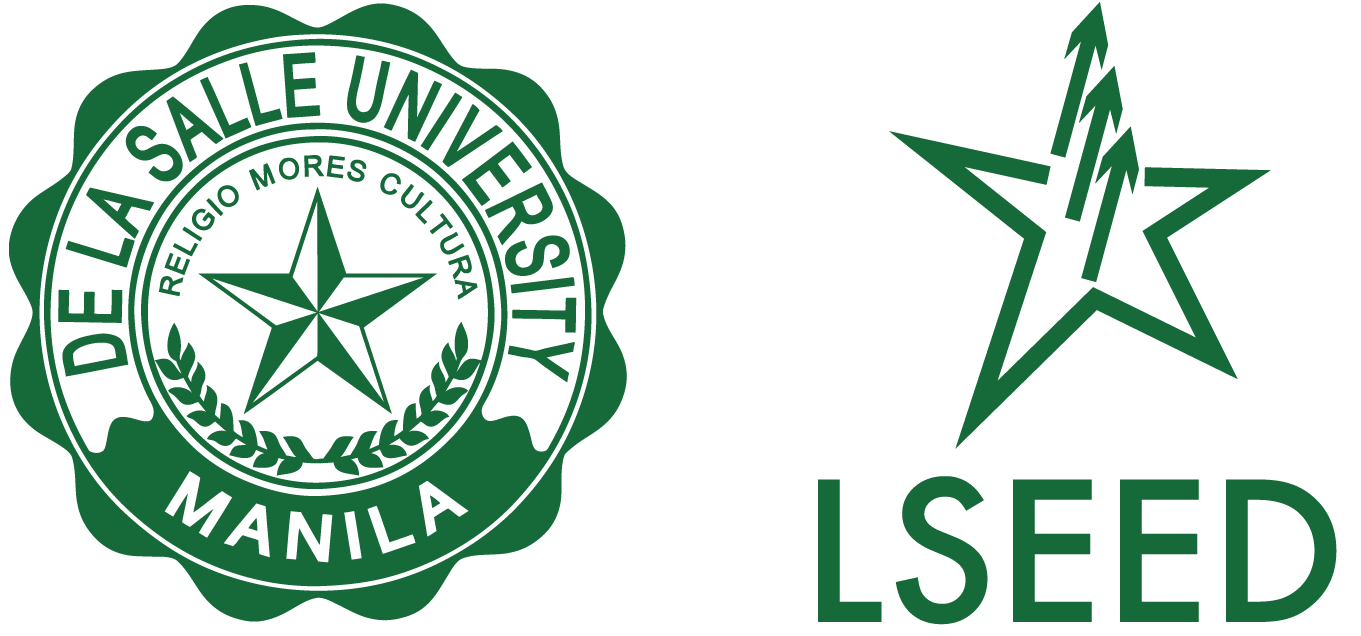
Have a say and vote for this entry to win the People's Choice Award!
500 points per vote
Provide your email address and click on "vote". You will then receive an email that enables you to verify your vote by clicking on a link.
1500 points for each share/re-post; 500 points for each like
This entry has not provided any social media links for community voting.
Summary
Key People

Dr. Norby Roque Salonga
Faculty, RVR College of Business and Founding Director, LSEED Center
De La Salle University
Images
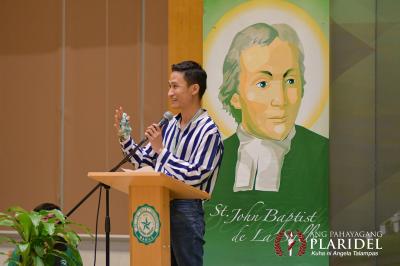
Dr. Norby Salonga addressing the Lasallian community on social entrepreneurship
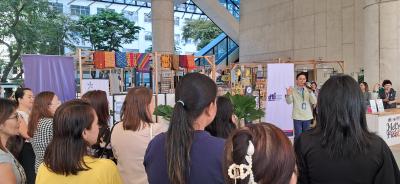
Social Enterprise Marketplace at DLSU
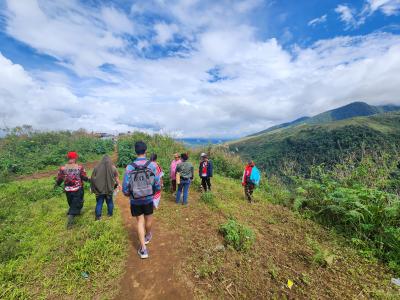
Dr. Norby Salonga visiting a community for social entrepreneurship
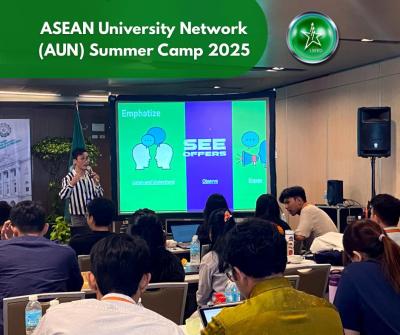
Dr. Norby Salonga facilitating a workshop on design thinking
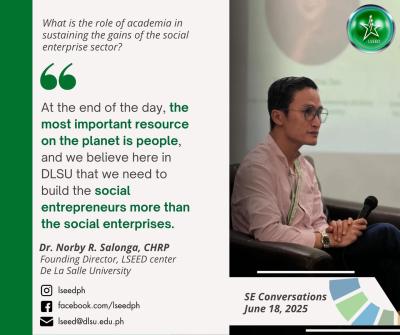
A learning session on social entrepreneurship
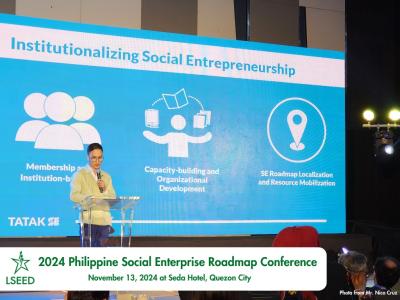
Dr Salonga promoting the institutionalization of social entrepreneurship in the academe
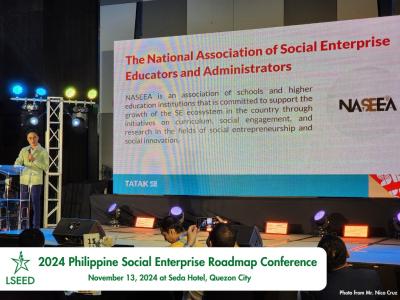
Promoting social entrepreneurship
IMPACT STORY
Impacting lifes
As the first university in the Philippines to introduce community-student ownership of social enterprises, Lasallian social entrepreneurship is defined as a multi-sectoral, multidisciplinary, and innovative approach to development that aims to address community social problems by utilizing concrete and inclusive business models that are anchored on the principles of sustainable development.
ENTSOCI highlights Lasallian social entrepreneurship. Final outputs for students include a social business model canvas, a social enterprise (business) plan, and a service learning project. These are then utilized and implemented in partnership with community partners and are aligned with other curricular and co-curricular engagements for social enterprises through the LSEED Center. This creates a sustainability mechanism across engagement/projects and colleges.
As a major course in entrepreneurship, ENTSOCI provides not only a learning opportunity, but the actual application of social innovation and social entrepreneurship for both students and community partners. One indicator of its impact is the recent profiling of social enterprises among programs of the LSEED Center. It revealed that retention of social enterprises among major programs is 100 % and income-generating SE is now 85 % for 2 straight years (LSEED, 2024). Another independent external evaluation in 2023 has revealed that the curriculum integration of social entrepreneurship is found to be effective in pursuing the engagement of students in impact-driven projects based on sustainability indicators (LSEED, 2023).
Another unique design of the course is its alignment with other curricular programs from senior high school up to 2nd year levels. This creates a strategy of formation among students who are engaged in the program and provides an open opportunity for others to explore social entrepreneurship beyond academic requirements through the LSEED Fellowship Program.
LEARNINGS
Lessons learned
As a way to support the growth of the social economy sector, social enterprise education is seen as a strategic move to form leaders and social entrepreneurs not just in the Philippines but on a global scale. Hence, Dr. Norby Salonga’s leadership in various councils and coalitions is part of his commitment to build more institutions and individuals (leaders and enablers) who will create relevant programs and pursue inclusive policies that will benefit the social enterprise sector and its stakeholders. As an educator, he believes that academia is in the right position to sustain the gains and achievements of the sector by ensuring that social entrepreneurship is introduced at the training level of children's development. He also emphasizes the need to invest in human resources by ensuring that capacity-building and skills development programs are made accessible and available, especially to community leaders, who will serve as co-formators of future social entrepreneurs.
FUTURE PLANS
What's coming?
With his leadership in the LSEED Center, with various local and international engagements, Dr. Salonga is driven to influence more academic institutions in the country and the region to pursue social entrepreneurship in the areas of curricular, research, and social engagement. This will now be supported by his leadership of the National Association of Social Enterprise Educators and Administrators, where he serves as chair. His involvement in policy and program development through the Poverty Reduction Through Social Entrepreneurship and Micro, Small, and Medium Enterprise Development Council (Committee on Management and Labor Capacities) will be further strengthened.
On a bigger scale, he now works with other universities and academic institutions in building their centers for social entrepreneurship and innovation and their full integration into the curriculum, research, and social engagement. To date, through various efforts, Dr. Norby has engaged over 80 academic institutions and has worked with over 170 civil society groups promoting social entrepreneurship and social innovation.

